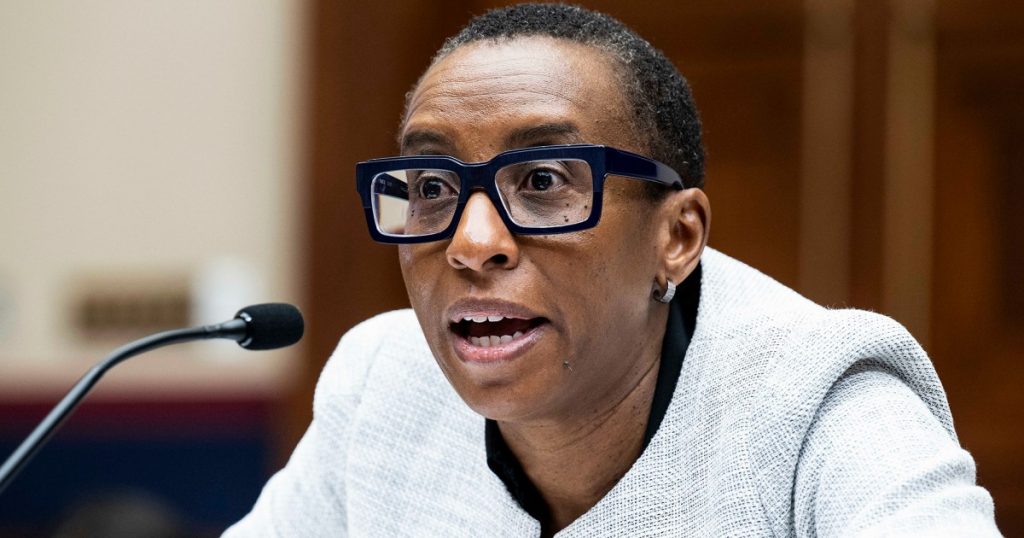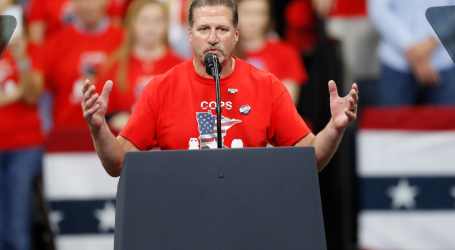What Claudine Gay’s Resignation From Harvard Means for the Rest of Us
Former Harvard President Claudine Gay. Michael Brochstein/Zuma
Fight disinformation: Sign up for the free Mother Jones Daily newsletter and follow the news that matters.Claudine Gay’s resignation from her post as president of Harvard University is a shocking new twist in the ongoing saga over campus free speech. Gay resigned on Tuesday amid new allegations of plagiarism leveled through an unsigned complaint published in the Washington Free Beacon, a conservative outlet that has long criticized Gay. The news, which was broken by the Crimson, comes after months of attacks on Gay’s response to campus antisemitism and weeks after university leaders reaffirmed their support for her. Gay’s stunning departure is the latest casualty in a growing conservative crusade against “diversity in education” and a chilling reminder of the state of campus free speech amid Israel’s war on Gaza.
“It has become clear that it is in the best interests of Harvard for me to resign,” Gay wrote in a letter to the Harvard community. “It has been distressing to have doubt cast on my commitments to confronting hate and to upholding scholarly rigor—two bedrock values that are fundamental to who I am.”
Gay’s 186-day tenure is the shortest in the school’s 388-year history.
Just six months ago, Gay was heralded as the future of Harvard University. “I stand before you on this stage with the weight and honor of being a first,” she told a rain-soaked crowd during her inauguration ceremony. Her journey to becoming Harvard’s first Black female president felt like the quintessential American dream: she is the daughter of Haitian immigrants, a Stanford graduate with a doctorate from Harvard. An accomplished political scientist with an emphasis on race, democracy, and politics, she was praised by university and political leaders alike after being named Harvard’s 30th president in late 2022. Massachusetts Gov. Maura Healey called her “a leader for our time” driven by the “values to meet the moment” at Gay’s September inauguration ceremony. Harvard’s governing board announced her selection with glee. “We are confident Claudine will be a thoughtful, principled, and inspiring president for all of Harvard,” wrote Harvard Corporation senior fellow Penny Pritzker. “She will be a great Harvard president in no small part because she is such a good person.”
Gay’s brief tenure collided with historic political assaults against diversity and education. In June, the Supreme Court struck down affirmative action in a case in which Harvard was at its center. The October 7 terrorist attack on Israel by Hamas instigated an ongoing war that’s claimed more than 22,000 lives. The war also set off a fierce debate on college campuses across the country over free speech. In one well-documented incident, a conservative group paid for a truck to circle around Harvard Square with a billboard on which the names and photos of opponents of Israel’s actions were displayed. The billboard dubbed them “Harvard’s Leading Antisemites.”
The furor came to a head in December during congressional testimony when Rep. Elise Stefanik (R-N.Y.) questioned three university presidents, including Gay, on their responses to campus antisemitism. When asked by Stefanik whether calling for the “genocide of Jews” violates university rules, Gay responded “it can be, depending on the context.” Penn president Liz Magill, who also emphasized context, resigned a week later. At first, Gay seemed to withstand the backlash when the Harvard Corp, which governs the university, voted to back her.
Gay’s critics then tried a new strategy: going after her academic record.
Building on the work of powerful Harvard alums who questioned Gay’s credentials and wondered aloud if she was a so-called “diversity hire,” conservative crusader Chris Rufo accused her of plagiarizing passages of her dissertation just days after Gay’s congressional testimony. The accusations set off a firestorm that resulted in Gay publicly requesting corrections in two articles. Since then, conservative groups, including the Heritage Foundation, have made a meal of attacking Gay’s academic record, claiming her ascension to the presidency was without merit. She reflected on these attacks in her farewell letter, writing that it has been “frightening to be subjected to personal attacks and threats fueled by racial animus.”
Her resignation not only shakes things up at the most prestigious university in the country, it also exposes a larger trend of racial regression that picked up in the years following the 2020 uprisings as Black leaders have been installed in positions of power only to find themselves undermined by the systems they sought to save. Love it or hate it, Harvard sets the tone for national and international debates. To conservative activists celebrating on Twitter, Gay’s ouster is part of a larger project to purge progressive Black leaders from public institutions. Or as Chris Rufo put it, to abolish “DEI ideology from every institution in America.” In the end, Gay’s presidency has created yet another first: Harvard’s first Black female president was also its shortest-serving.





